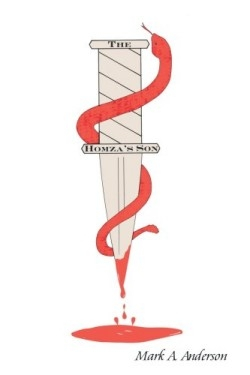The Homza's Son
Wayne Homza is an ordinary boy unknowingly equipped with extraordinary telekinetic powers. Wayne learns to control his abilities, using them for good as well as evil, but there is an unseen force working against him somewhere in his quaint town of Wilkes-Barre, Pennsylvania, and the two are on a collision course with deadly consequences.
This is the setting for Mark A. Anderson’s first novel, originally written in 1982, which owes more than its fair share to Stephen King’s first novel, Carrie. In fact, the similarities are endless, with Anderson stealing key phrases and events from King’s original tale and attempting to pass them off as his own. The most glaring example is the process of telekinesis occurring in an adolescent mind in small town America. Wayne Homza, much like Carrie White, comes from a strong religious background and has attended Catholic schools throughout his childhood. Of course, there is something glaringly wrong with him, and in time Wayne learns of his abilities and the practice of “flexing” them much like you would a muscle. Sadly, the idea for this process is lifted directly from King’s novel in which Carrie White learns to “flex” her telekinesis as a means of revenge to those who bully her.
In some ways, Anderson makes the story his own, adding an opposing force that is never quite as menacing and ominous as he would have the reader believe, and even trying to add an air of humanity and redemption to his protagonist by having him use his powers for the betterment of mankind. Sadly, Anderson’s writing is weak and uninspired: “After the phone call they started kissing to ring in the New Year. Then they got on the bed and sexually aroused each other.” The prose is dry and lacks a descriptive quality. The entire book has a certain matter-of-fact feel to it, with the author struggling to simply relate the bare essentials of the story rather than engage his audience and paint a vivid portrait: “After a while of just sitting there, Wayne decided to go to bed. In the waking hours of night, he started dreaming a dream that would require interpretation.” The characters are one-dimensional and stale, and the story itself doesn’t stand a chance when compared to King’s masterpiece.
There are also quite a few grammatical and formatting errors throughout the book, which makes reading it a tedious task. There seems to be little, if any, attention to detail here; paragraphs aren’t indented properly, misspellings abound, and punctuation is hacked to bits. There doesn’t appear to be any real effort to craft this book into a moderately workable story. Often young writers tend to imitate their favorite author’s style of writing, and even more often they tend to unknowingly steal their ideas and pass them off as their own. This is true of Anderson; The Homza’s Son is nothing more than an uninspired and mangled version of a stunning novel by one of the greats.
Reviewed by
Liam Brennan
Disclosure: This article is not an endorsement, but a review. The publisher of this book provided free copies of the book and paid a small fee to have their book reviewed by a professional reviewer. Foreword Reviews and Clarion Reviews make no guarantee that the publisher will receive a positive review. Foreword Magazine, Inc. is disclosing this in accordance with the Federal Trade Commission’s 16 CFR, Part 255.

